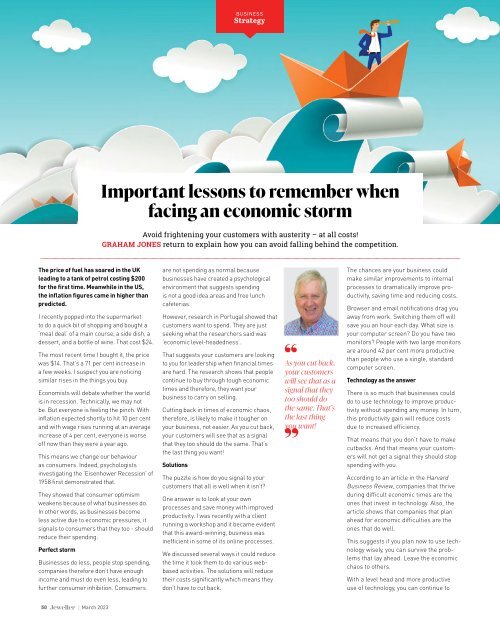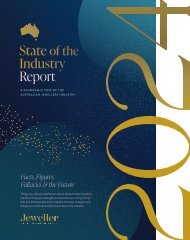Jeweller - March 2023
You also want an ePaper? Increase the reach of your titles
YUMPU automatically turns print PDFs into web optimized ePapers that Google loves.
BUSINESS<br />
Strategy<br />
Important lessons to remember when<br />
facing an economic storm<br />
Avoid frightening your customers with austerity – at all costs!<br />
GRAHAM JONES return to explain how you can avoid falling behind the competition.<br />
The price of fuel has soared in the UK<br />
leading to a tank of petrol costing $200<br />
for the first time. Meanwhile in the US,<br />
the inflation figures came in higher than<br />
predicted.<br />
I recently popped into the supermarket<br />
to do a quick bit of shopping and bought a<br />
‘meal deal’ of a main course, a side dish, a<br />
dessert, and a bottle of wine. That cost $24.<br />
The most recent time I bought it, the price<br />
was $14. That’s a 71 per cent increase in<br />
a few weeks. I suspect you are noticing<br />
similar rises in the things you buy.<br />
Economists will debate whether the world<br />
is in recession. Technically, we may not<br />
be. But everyone is feeling the pinch. With<br />
inflation expected shortly to hit 10 per cent<br />
and with wage rises running at an average<br />
increase of 4 per cent, everyone is worse<br />
off now than they were a year ago.<br />
This means we change our behaviour<br />
as consumers. Indeed, psychologists<br />
investigating the ‘Eisenhower Recession’ of<br />
1958 first demonstrated that.<br />
They showed that consumer optimism<br />
weakens because of what businesses do.<br />
In other words, as businesses become<br />
less active due to economic pressures, it<br />
signals to consumers that they too - should<br />
reduce their spending.<br />
Perfect storm<br />
Businesses do less, people stop spending,<br />
companies therefore don’t have enough<br />
income and must do even less, leading to<br />
further consumer inhibition. Consumers<br />
are not spending as normal because<br />
businesses have created a psychological<br />
environment that suggests spending<br />
is not a good idea.areas and free lunch<br />
cafeterias.<br />
However, research in Portugal showed that<br />
customers want to spend. They are just<br />
seeking what the researchers said was<br />
‘economic level-headedness’.<br />
That suggests your customers are looking<br />
to you for leadership when financial times<br />
are hard. The research shows that people<br />
continue to buy through tough economic<br />
times and therefore, they want your<br />
business to carry on selling.<br />
Cutting back in times of economic chaos,<br />
therefore, is likely to make it tougher on<br />
your business, not easier. As you cut back,<br />
your customers will see that as a signal<br />
that they too should do the same. That’s<br />
the last thing you want!<br />
Solutions<br />
The puzzle is how do you signal to your<br />
customers that all is well when it isn’t?<br />
One answer is to look at your own<br />
processes and save money with improved<br />
productivity. I was recently with a client<br />
running a workshop and it became evident<br />
that this award-winning, business was<br />
inefficient in some of its online processes.<br />
We discussed several ways it could reduce<br />
the time it took them to do various webbased<br />
activities. The solutions will reduce<br />
their costs significantly which means they<br />
don’t have to cut back.<br />
As you cut back,<br />
your customers<br />
will see that as a<br />
signal that they<br />
too should do<br />
the same. That’s<br />
the last thing<br />
you want!<br />
The chances are your business could<br />
make similar improvements to internal<br />
processes to dramatically improve productivity,<br />
saving time and reducing costs.<br />
Browser and email notifications drag you<br />
away from work. Switching them off will<br />
save you an hour each day. What size is<br />
your computer screen? Do you have two<br />
monitors? People with two large monitors<br />
are around 42 per cent more productive<br />
than people who use a single, standard<br />
computer screen.<br />
Technology as the answer<br />
There is so much that businesses could<br />
do to use technology to improve productivity<br />
without spending any money. In turn,<br />
this productivity gain will reduce costs<br />
due to increased efficiency.<br />
That means that you don’t have to make<br />
cutbacks. And that means your customers<br />
will not get a signal they should stop<br />
spending with you.<br />
According to an article in the Harvard<br />
Business Review, companies that thrive<br />
during difficult economic times are the<br />
ones that invest in technology. Also, the<br />
article shows that companies that plan<br />
ahead for economic difficulties are the<br />
ones that do well.<br />
This suggests if you plan now to use technology<br />
wisely, you can survive the problems<br />
that lay ahead. Leave the economic<br />
chaos to others.<br />
With a level head and more productive<br />
use of technology, you can continue to<br />
50 | <strong>March</strong> <strong>2023</strong>

















